How Do I Help My Kitten Gain Weight?
If you suspect your kitten may be too thin, here are tips on how to know for sure that they’re underweight — and if they are, what you can do to help them.
If you suspect your kitten may be too thin, here are tips on how to know for sure that they’re underweight — and if they are, what you can do to help them.
by Mollie Jackman, | September 11, 2024

Inga / Adobe Stock
It’s objectively true that kittens, all bundles of energy, are endlessly cute. But caring for such a small, helpless creature can also be nerve-wracking, especially when they’re not developing at a healthy rate. As a pet parent, one of the first things you’ll learn is to monitor your kitty’s weight meticulously. And if they’re not growing at a normal pace, well, you’ll need to intervene immediately.
Helping a kitten gain weight is absolutely achievable, but it requires a careful balance of proper nutrition, feeding frequency, and monitoring for underlying health issues. Whether your kitten is underweight due to illness, stress, or simply being a picky eater, addressing the root cause is essential.
We’ve put together the below guide to provide you with practical steps to help your kitten thrive, from choosing nutrient-rich foods to creating comfortable, stress-free feeding environments. Your dedication to their well-being will make all the difference in their journey toward a healthy weight.
A big part of adopting a new kitten is determining if they’re at a healthy weight. This can be tricky to determine since they’re still growing. Luckily, there are a few key indicators that will help.
Ribs: Gently run your hands along your kitten’s sides. You should be able to feel their ribs without pressing hard, but they shouldn’t be visibly protruding. If you can see their ribs, your kitten may be underweight.
Waistline: When viewed from above, your kitten should have a slight waistline just behind the ribs. A kitten with a very pronounced waist could be underweight, while a kitten with no waist may be overweight.
Abdomen: From the side, your kitten’s belly should angle up slightly behind the ribs. A sagging belly may indicate extra weight, while a sharp angle may indicate they’re underweight.
Behavior and energy levels: Healthy kittens are typically active, playful, and curious. A lack of energy might indicate a health issue, including being underweight.
At your kitten’s veterinarian visit, the doctor can provide a more accurate assessment of your kitten’s weight. They may use a Body Condition Score (BCS), which ranges from one to nine, with one being severely underweight and nine being severely overweight. A score of four to five is typically ideal for a growing kitten.
Kitten Body Condition Score (BCS) Chart
BCS Score | Description | Indicators |
1 to 3 | Underweight | Ribs, spine, and hip bones visible, with little-to-no fat coverage |
4 to 5 | Ideal | Ribs palpable but not visible, noticeable waistline |
6 to 9 | Overweight | Ribs difficult to feel, no obvious waistline, rounded abdomen |
With regular checkups, your vet can help you track your kitten’s growth and ensure they’re on the right path.
It can be scary when your kitten is not growing or gaining weight. Identifying the root cause is important to address the problem effectively and ensure your kitten grows strong and healthy. Here are some common reasons why a kitten might be underweight.
Inadequate feeding: Your kitten may not be getting enough food (or the right type of food) for their growing needs.
Competition for food: In multi-pet households, a kitten might be missing out on meals if they have to compete with other pets for food.
Stress: Changes in the environment, new pets, single-kitten syndrome, or separation anxiety can lead to reduced appetite and weight loss.
Transitioning to solid food: If your kitten is weaning, they might struggle with the transition from milk to solid food, leading to temporary weight loss.
If none of these common factors seem to apply, it’s possible that more complex health issues could be at play. Below are some health conditions that might be affecting your kitten’s ability to gain weight.
Intestinal parasites (like worms) are a common cause of weight loss in kittens. These parasites leach nutrients from the digestive system, leading to malnutrition even if your kitten is eating well. Symptoms may include a pot-bellied appearance, diarrhea, and vomiting. Regular deworming treatments, as advised by your vet, can help treat this issue.
Kittens are susceptible to various infections that can cause weight loss, including upper respiratory infections, which may reduce their appetites, or more serious conditions like Feline Infectious Peritonitis (FIP). If your kitten is showing signs of illness, such as lethargy, fever, or respiratory issues, it’s important to seek veterinary care immediately.
Some kittens are born with congenital health problems that can affect their ability to gain weight. Conditions such as heart defects or metabolic disorders may require specialized care and ongoing management. If your kitten’s weight gain is consistently low despite proper feeding, your vet may suggest further testing to identify any underlying conditions.
Some kittens may struggle to absorb nutrients from their food due to conditions like inflammatory bowel disease (IBD) or exocrine pancreatic insufficiency (EPI). These interfere with digestion, leading to weight loss regardless of food intake. Treatment typically involves dietary changes and medications.
Understanding why your kitten is underweight is the first step toward helping them gain the weight they need to thrive. Whether it’s a matter of adjusting their diet or addressing a health issue, timely intervention can make all the difference.
No matter the reason, helping an underweight kitten reach a healthy weight requires patience: Weight gain in kittens should be gradual and steady to avoid stressing their developing bodies. By focusing on nutrient-rich foods, proper feeding routines, and supplements (as needed), you can support your kitten’s healthy growth.
One of the most effective ways to help your kitten gain weight is to provide high-calorie, nutrient-dense cat food. Look for kitten-specific formulas rich in protein and fat, such as the following.
High-quality wet food: Wet food is often more palatable and easier to digest for kittens. It also has a higher moisture content, which can be beneficial for hydration. Pro tip: If your kitten is struggling to transition to kibble, try making “gruel“ by mixing kibble and wet food.
Kitten food with added calories: Try specialized kitten foods designed for weight gain, which contain additional calories and essential nutrients to support growth.
Always choose a food brand that lists a high-quality source of protein, such as chicken or fish, as the first ingredient, and consult your vet to ensure the food meets your kitten’s needs. Consider these dietary factors when creating your cat-care budget. (Keep in mind there are resources out there for financial assistance with vet care.)
For underweight kittens, increasing the number of meals per day can make a big difference. Instead of feeding your kitten two or three large meals, try offering four to six smaller meals throughout the day. This approach can help maintain energy levels and encourage your kitten to eat regularly. As a bonus, extra meal times may speed up the process of bonding with your kitten.
Be sure to monitor portion sizes and avoid overfeeding during any single meal. Kittens have very small stomachs and can’t eat too much at once.
In some cases, adding cat weight-gain supplements to your kitten’s diet can provide the extra nutrients they need. Common supplements may include the following.
Nutritional gel: These high-calorie gels are packed with vitamins, minerals, and calories in a form that’s easy for kittens to consume.
Probiotics: Adding probiotics can help improve digestion and nutrient absorption, which is crucial for weight gain in kittens with digestive issues.
Always consult your vet before introducing new supplements to ensure they are appropriate for your kitten’s specific health needs.
Stress can significantly impact a kitten’s appetite and overall health. But there are ways to mitigate this.
Choose a quiet feeding area: Set up a quiet, safe space for your kitten to eat, away from other pets or loud noises.
Establish a routine: Kittens thrive on routine, so feeding them at the same times each day can help reduce stress and improve their eating habits.
Combining these strategies in close cooperation with your vet can help your kitten gain weight at a healthy speed. Remember that patience is key, and gradual weight gain is the way to go.
While some weight issues can be managed at home with dietary adjustments, there are times when professional guidance is necessary to ensure your kitten’s health and well-being. Here are a few examples.
If your kitten continues to lose weight despite your efforts to increase their food intake, this could be a sign of an underlying health issue that needs medical attention.
Symptoms like diarrhea, vomiting, lethargy, coughing, or difficulty breathing are red flags that require immediate veterinary care for an underweight kitten.
If you’ve implemented strategies like increased meal frequency, higher-calorie food, and supplements, but your kitten’s weight hasn’t improved after a couple of weeks, it’s time to consult your vet.
Changes in behavior (such as a sudden lack of interest in food, hiding, or reduced activity levels) can indicate a health problem that needs professional attention.
Early intervention can help address potential health issues before they become serious. Your vet can conduct a thorough examination, run diagnostic tests if necessary, and provide tailored advice or treatment to help your kitten achieve a healthy weight. Regular check-ups are also recommended to monitor your kitten’s growth and overall health as they develop.
Yes. While kittens are more commonly underweight, they can become overweight. This often happens due to overfeeding, lack of exercise, or food with low nutritional value.
If your young cat is eating but not gaining weight, there could be several reasons why. This could be due to parasites, malabsorption issues, or underlying health conditions that are preventing proper nutrient absorption. Consult your veterinarian to determine the cause and recommend treatment or dietary changes.
When you need a cat to gain weight, try kitten-specific food with high nutritional value. You can also increase feeding frequency or try high-calorie supplements for cats. It’s important to speak with your vet before deciding on a course of action.

Mollie Jackman is a writer, editor, and graduate of Lindenwood University’s MFA in writing. She’s also a pet parent to a goofy big-eared dog and two brown tabby cats, plus a rotating cast of foster animals. When she’s not reading, writing, or picking up strays, she can be found binge-watching arguably terrible reality TV shows and cooking competitions or rolling around the local skating rink in Columbia, Missouri. Mollie’s writing on this site is not in any way affiliated with the University of Missouri, or her work as a copywriter for MU Health Care.
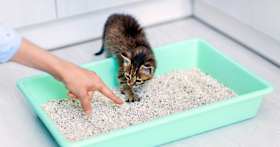
Behavior & Training
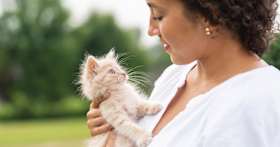
Adoption Advice

Foster & Volunteer
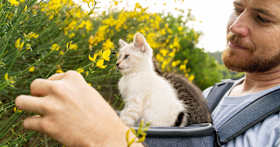
Adoption Advice
Learn about the key vaccinations and environmental considerations that go into determining when it’s okay for your kitty to venture out of your home.
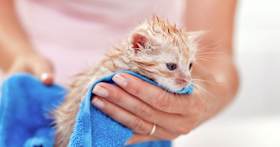
Adoption Advice
Although kittens typically bathe themselves, there are occasions when a gentle bath is necessary.

Adoption Advice
Here are some important factors to consider when deciding how big to grow your feline family.

Behavior & Training
From diet to health concerns, here’s a guide to how to know for sure, what may be causing this issue in your cat, as well as some potential treatments for it.
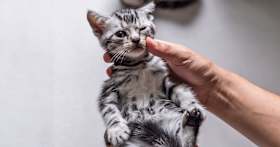
Adoption Advice
Worms are common in cats, especially in kittens. Thankfully, freeing your feline from worms is not that difficult.

Behavior & Training
From kibble to cable wires, here’s a peek into your cat’s chewing habits — and how to decode their behavior when they’re nibbling on all the things.